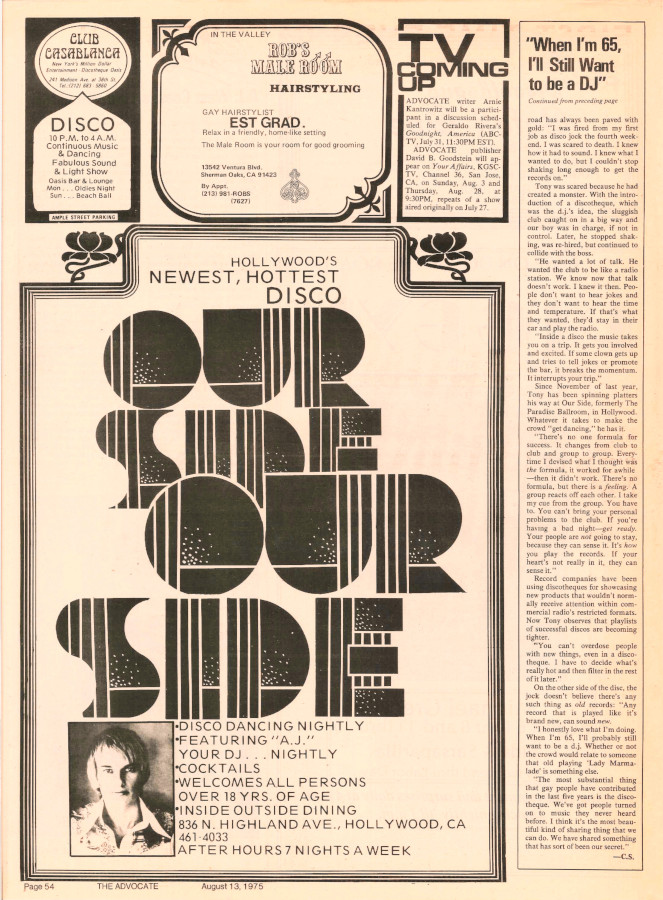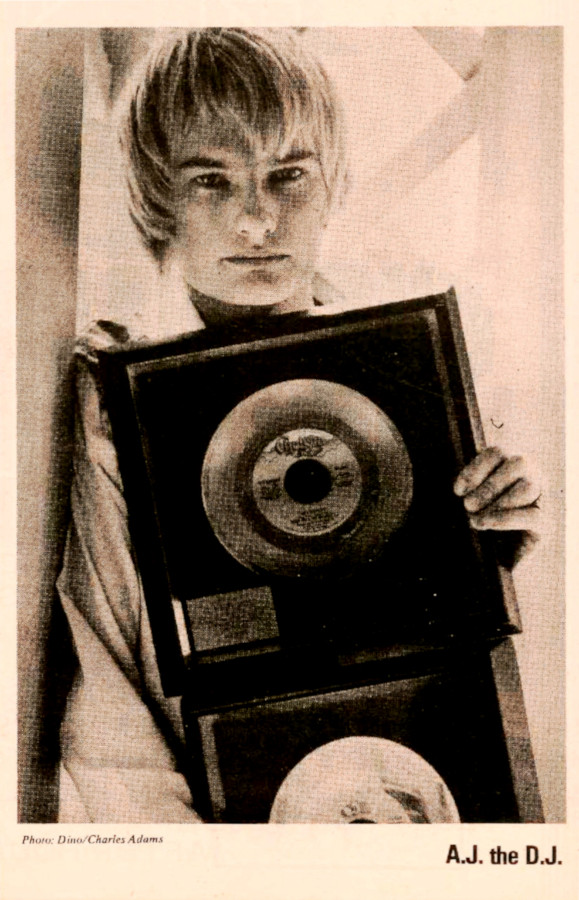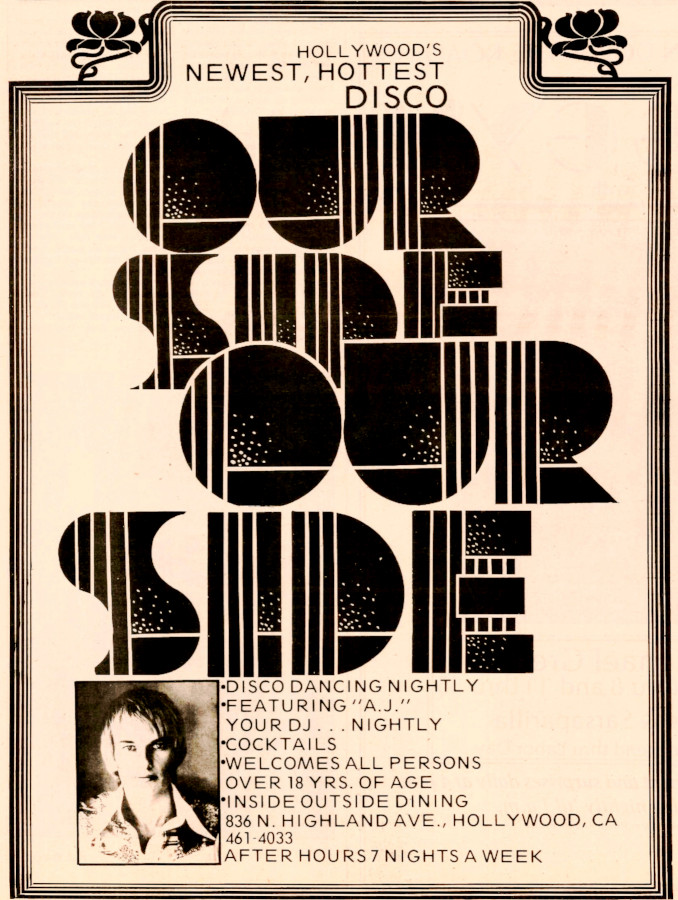Concluding this series of articles from The Advocate’s August 1975 Discos! issue, is an interview with A.J. Miller AKA A.J. the D.J., by Christopher Stone.
Other than a spot on the Legends of Vinyl DJ Hall of Fame, there isn’t much trace of A.J. Miller these days, or whatever became of him. When this was printed, Miller appears to have been quite a heavy hitter in the LA disco scene at the time, later presiding over at least a couple of disco record pools (for which he was quoted in Billboard a couple times). Miller also appears to have been a close associate of producer/songwriter Bob Crewe, whom I’ve covered here a couple of times in the past. Miller is thanked/credited on two of Crewe’s albums from the time - his “Street Talk” LP as The Bob Crewe Generation (see Disco Delivery #66) and the first Disco-O-Tex & His Sex-O-Lettes album, whose hit song “Get Dancin’” was apparently inspired by a AJ having a moment on the mic at an earlier gig, when Crewe was tagging along.
Miller was also mentioned in the last transcribed post from this issue as the DJ at Our Side, which had formerly been The Paradise Ballroom and before that, Dude City. Apparently both venues were owned by notorious LA underworld figure Eddie Nash. No word on what was the case with it’s brief turn as “Our Side,” but apparently it was only known as such for a brief period, changing its name back to The Paradise Ballroom after its competition across the street, named The Other Side (briefly described in the last post as Hollywood’s “chicken de-light disco”) mysteriously burned down. The venue would also be known as 836 North for a period, eventually becoming Probe in 1978. Probe would last for a good 21 years before closing in 1999.
I have to say, I enjoy Miller’s comments here, talking not only about good gigs and career highlights but also being fired from his first gig and how one can seem to feel a good or a bad night coming on. This interview also traces some evolving elements of disco at the time - from DJ’s on the mic falling out of favour, to just how influential discos and disco DJ’s were in breaking records that would have otherwise fallen through the cracks, like Barry White & The Love Unlimited Orchestra’s “Love’s Theme." It’s the one specific song mentioned more than any other in this issue alone, which I should add, earned Miller one of the gold records he's pictured with in the article.
Can’t help but wonder whatever happened to A.J. Miller, whether or not he continued DJing into his old age like he suggested he would. Either way, this is an interesting interview showing just how influential disco DJs, in particular gay disco DJs and audiences were becoming at this point.


“Get Dancing” AJ: West Coast’s Gold-Plated DJ
By Christopher Stone
“Get Dancing!” Howled disco jockey Tony Miller night after night. His bid to boogey was a familiar one to patrons of The Barbary Coast, San Diego’s first gay disco bar.
What Tony, a.k.a. AJ the DJ, didn’t know then was that his command to “get dancing” would be the inspiration for the international disco anthem and a record that would catapult Disco Tex & The Sex-O-Lettes to stardom. Tony remembers the fateful Friday two years ago:
“Bob Crewe, who has written or produced about 56 gold records, was in town to visit my roommate and me. That Friday night he came to The Barbary Coast where I was working. It was cooking. I was doing my thing on the mike. I was screaming, ‘Get dancing!’ and what-have-you.
“Bob had been to discotheques in New York, but he said it was at our club that it first struck him how important discos were going to become. Bob frightens me because he knows today what you and I are going to be into tomorrow.”
Tony and Bob spent the weekend clowning around, listening to old tapes, and even staging a mock musical with the jock’s idea of discotheque stage performance. Tony’s concept was eventually developed into the Disco Tex & His Sex-O-Lettes album.
“Bob called one night, months later, and said. ‘I’m sending you something’.”
That something was an advance copy of “Get Dancin’,” which Tony premiered at San Diego’s women’s club, Diablo.
“Those girls didn’t know it, but that night when I broke ‘Get Dancin,’’ they were the first people in the world to hear it. I have never been so excited about a record in my life. I called Bob Crewe when I got home - about four in the morning. I woke him out of a sound sleep and started screaming about the record.”
Because he was the first to break the record in discos and because he fought to get it radio airplay, Tony was awarded a gold record by Chelsea, distributor of “Get Dancin’.” This marked the jock’s second esteemed platter. 20th Century Records gave him gold for being the first to introduce “Love’s Theme” in discos. (To his knowledge, Tony is the only disco d.j. on the West Coast to have a gold record.)
“Convincing 20th Century to release ‘Love’s Theme’ as a single was a real struggle. Barry White went around and around. He didn’t want to release the song. He released four other cuts instead, and they went right down the tubes. It took six months to convince him that this was the hit off the album.
“By that time it was in every discotheque in the world. ‘Love’s Theme’ has sold over 2 1/2 million copies and it’s still selling.”
Lest you think Tony’s disco road has been paved with gold: “I was fired from my first job as a disco jock the fourth weekend. I was scared to death. I knew how it had to sound. I knew what I wanted to do, but I couldn’t stop shaking long enough to get the records on.”
Tony was scared because he had created a monster. With the introduction of a discotheque, which was the d.j.’s idea, the sluggish club caught on in a big way and our boy was in charge, if not in control. Later, he stopped shaking, was re-hired, but continued to collide with the boss.
“He wanted a lot of talk. He wanted the club to be like a radio station. We know now that talk doesn’t work. I knew it then. People don’t want to hear jokes and they don’t want to hear the time and temperature. If that’s what they wanted, they’d stay in their car and play the radio.
“Inside a disco the music takes you on a trip. It gets you involved and excited. If some clown gets up and tries to tell jokes or promote the bar, it breaks the momentum. It interrupts your trip.”
Since November of last year, Tony has been spinning platters his way at Our Side, formerly The Paradise Ballroom, in Hollywood. Whatever it takes to make the crowd “get dancing,” he has it.
“There’s no one formula for success. It changes from club to club and group to group. Every time I devised what I thought was the formula, it worked for awhile - then it didn’t work, There’s no formula, but there is a feeling. A group reacts off each other. I take my cue from the group. You have to. You can’t bring your personal problems to the club. If you’re having a bad night - get ready. Your people are not going to stay, because they can sense it. It’s how you play the records. If your heart’s not really in it, they can sense it.”
Record companies have been using discotheques for showcasing new products that wouldn’t normally receive attention within commercial radio’s restricted formats. Now Tony observes that playlists of successful discos are becoming tighter.
“You can’t overdose people with new things, even in a discotheque. I have to decide what’s really hot and then filter in the rest of it later.”
On the other side of the disc, the jock doesn’t believe there’s any such thing as old records: “Any record that is played like it’s brand new, can sound new.
“I honestly love what I’m doing. When I’m 65, I’ll probably still want to be a d.j. Whether or not the crowd would relate to someone that old playing ‘Lady Marmalade’ is something else.
“The most substantial thing that gay people have contributed in the last five years is the discotheque. We’ve got people turned on to music they never heard before. I think it’s the most beautiful kind of sharing thing that we can do. We have shared something that has sort of been our secret.”
PREVIOUS RELATED ENTRIES:
vintage articles: cheap thrills, entertainment and escapism - by christopher stone // the advocate - august 13, 1975 (wednesday may 5, 2021)
vintage articles: wanna dance? get wrecked to the ass! - by vito russo // the advocate - august 13, 1975 (wednesday april 28, 2021)
vintage articles: exclusive supremes interview - by christopher stone // the advocate - august 13, 1975 (sunday march 21, 2021)
vintage articles: ‘the first step in getting ahead is getting started.’ an interview with bob crewe. - by donald von wiedenman // the advocate - april 7, 1976 (tuesday march 17, 2015)
disco delivery #66: the bob crewe generation - street talk (1976, elektra) (sunday march 15, 2015)
LINKS:
discomusic.com - clubs & discotheques: probe (836 n. highland, los angeles, ca) (web archive)
discomusic.com - clubs & discotheques: paradise ballroom (los angeles, ca) (web archive)
discomusic.com - clubs & discotheques: dude city (836 n. highland, los angeles, ca) (web archive)
discomusic.com - clubs & discotheques: the barbary coast (pacific highway, san diego, ca) (web archive)
queer maps: probe
wikipedia: disco tex & the sex-o-lettes - get dancin’
all music guide: disco tex & his sex-o-lettes lp (review)
discogs: disco tex & his sex-o-lettes - the disco tex & the sex-o-lettes review lp
discogs: the love unlimited orchestra - rhapsody in white lp
all music guide: the love unlimited orchestra - love’s theme (review)
the washington post - selling a hit: you don't need a radio if you're hot in discos (by timothy moore) (september 1, 1977)
CATEGORIES: VINTAGE ARTICLES, INTERVIEWS



No comments:
Post a Comment